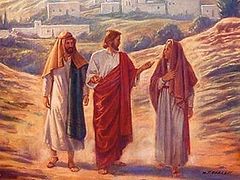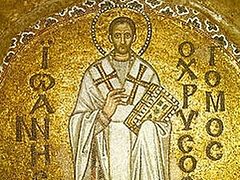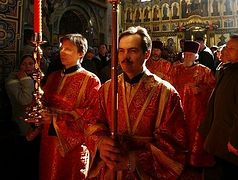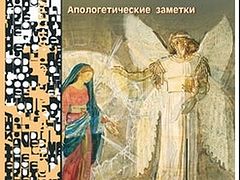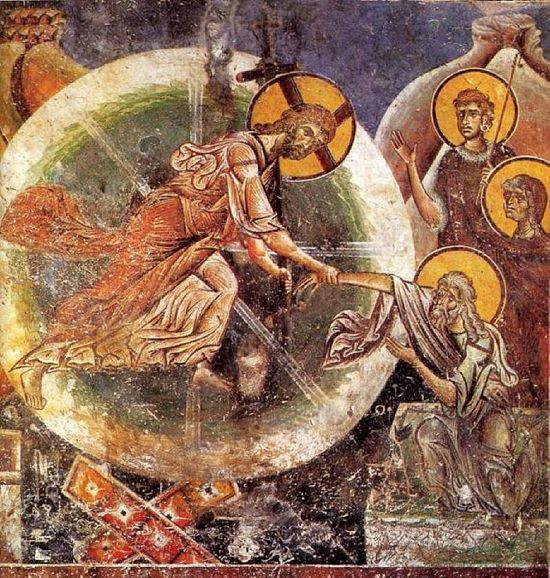
As all die in Adam, so in Christ shall all revive (1 Cor. 15:22). These Apostolic words expound upon not only the physical resurrection of people, but, in the first place, upon spiritual rebirth. As death can be either physical or spiritual (when the soul loses divine grace), so resurrection can be either physical (when the soul returns to its body) or spiritual (when the soul acquires the grace of God). The spiritual death of Adam, coming from the loss of communication with God, preceded his physical death. Death, because of moral damage, has come from Adam to all mankind. The resurrection of Christ constitutes the beginning of our spiritual resurrection, the awakening of spiritual longing in us toward our moral rebirth.
Referring to this spiritual resurrection of believers our Lord said: "Time is coming, and has already come, when the dead shall hear the voice of the Son of God, and having heard it—shall come to life" (John 5:25). This is that "first" resurrection which the Book of Revelations discloses (Rev. 20:5). It means that people, after believing in the Son of God, are reborn in the sacrament of Baptism and become able to lead a spiritual life. God's grace becomes active in them and helps them to attain perfection. That is why the Apostles consoled Christians, reminding them that they, as opposed to non-believing gentiles, have already resurrected with Christ (Col. 3:1).
Spiritual resurrection in this life shall serve as a foundation for the physical resurrection, which shall come through the power of God Almighty on the last day of this world. Thenceforth, the souls of all the dead shall return to their bodies, and all mankind will come to life, no matter where and how each person died. The Lord predicted the universal resurrection, saying: The time is coming, when all lying in the graves shall hear the voice of the Son of God, and those who did good shall go into the resurrection of life, and those who administered evil shall go into the resurrection of condemnation (John 5:28-29). On that day the appearance of each person will reflect his or her inner state: some of the resurrected will be bright and joyous, but others will appear hideous and awful as walking dead.
One should discern between the universal resurrection, which will happen at the end of the world, and the particular resurrections, which the Lord Jesus Christ and His disciples performed during their lifetime. Several examples would be the resurrections of Jairus’ daughter, the son of Nain's widow, the four-day-dead Lazarus, and so forth — all were cases of temporary awakening from death. As we know, some years later all those resurrected died again as all people do. However, at the time of universal resurrection, all people will rise up from the dead to live with their resurrected bodies forever. The resurrection of the dead on the last day of the world will be universal and simultaneous, both for the righteous and for the sinners. Then all the dead shall come forth: they that have done good unto the resurrection of life, and they that have done evil unto the resurrection of damnation (John 5:29).
From the Scriptures one has to conclude that the appearance of the resurrected righteous will be different from that of resurrected sinners. The resurrected bodies will be essentially the same ones that belonged to their souls in this early life. As the Apostle says: THIS corruptible must put on incorruption, and THIS mortal must put on immortality (1 Cor. 15:53). But at the same time, they will be transfigured. The bodies of the righteous will be incorrupt and immortal. They will be completely free from weakness and from the infirmities of the present life; they will be spiritual, heavenly, similar to the body of the resurrected Christ. Life after resurrection will be like the life of the angels. As for the sinners, their bodies also will rise in a new form, but while receiving an incorrupt and spiritual nature, at the same time they will express in themselves the condition of their souls.
The celebration of Easter is marked by Orthodox Christians so joyfully because during the Paschal days they feel, more than at any other time, the reviving power of Christ's resurrection, the power that has dethroned the prince of darkness, liberated souls from the abyss of hell, opened the doors to paradise, defeated the bonds of death, and poured new life into the souls of believers.
It is significant that during Easter the Paschal joy, to a greater or lesser extent, is felt by so many people—not only those of profound belief, but also those who are cool-spirited and aloof from God. On this day all creation rejoices at the victory of life over death.


